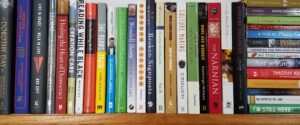The last BookNotes column was important and we hope you saw it.
We described a brand new (perhaps temporary) Hearts & Minds online e-commerce website.
This new web-based, curated bookstore clearly does NOT show all of our in-store inventory (not even close) but it DOES offer a handful of good suggestions in about FIFTY categories of books! Wow.
From church life to politics, from the arts to science, from global issues to medical care, from spirituality to racial justice, from theology to popular culture, and more (a lot more — forty-plus categories more) this custom curated e-commerce site is a good indication of much of what we’re about here at the shop.
It was designed for students and adults taking in the CCOs virtual Jubilee 2021 conference, so there is a bit of particular connection there. (The books of Jubilee speakers like Tish Harrison Warren, Jon Tyson, Ashlee Eiland and Justin McRoberts, are highlighted and we show the books that I described in four jam-packed book talks that aligned with the themes of the four major Jubilee talks – creation, fall, redemption, and restoration.)
All of the other titles shown are great – it is why we picked them. Some are more basic, other more complex, and our annotations, as always, try to inform book lovers about the style and strengths of each. Most are overtly religious, some less so. It was a lot of work putting it all together and we’re not sure how long we’ll keep it up as is, so you really ought to check it out.
In that last BookNotes we offered a 10% off PROMO CODE for anyone ordering in that convenient shopping cart platform.
If you’d rather order at our more standard, personal website at our usual website order form page, you can do that, too. Just mention that you saw whatever you’ve selected at our J Bookstore site and we’ll give you the discount.
Spread the word, won’t you? I think I can pretty confidently say you’ve never seen this mix of titles and this scope of topics in any bookstore, ever. As we’ve said boldly to some, we think it will blow your mind seeing theological books on everything from farming to racial justice, from science to film, from prayer to politics, from counseling to church, from worship to work.
HERE IT IS.
https://heartsandmindsbooks.square.site/
NOW. A LIST OF BRAND NEW BOOKS for MARCH 2021
Here are reviews of brand new books that we’ve mostly gotten in since we’ve last written. Man, the new titles just keep coming and we are thrilled to be able to say we’ve got stacks of these, waiting for you to order. These, shown below, are all 20% off.
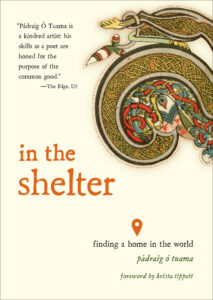 In the Shelter: Finding Home in the World Padraig O Tuama (Broadleaf Books) $19.99 OUR SALE PRICE = $15.99
In the Shelter: Finding Home in the World Padraig O Tuama (Broadleaf Books) $19.99 OUR SALE PRICE = $15.99
This is surely one of the season’s most highly anticipated books, at least in some circles, since the author became an overnight sensation with the NPR poetry podcast which he hosted launched a year ago. We had an earlier version of this as an import from the UK – Padraig O Tuama lives in Northern Ireland in a spirituality and peace-making community called Corrymeela and we’ve stocked his other books such as Daily Prayer with the Corrymeela Community and the poetry collection Sorry for Your Troubles. We’ve long been fans and have friends that know him. (And – get this! – we have his brand new co-authored reflections on the book of Ruth called Borders and Belonging: The Book of Ruth: A Story for our Times [Canterbury Press; $20.99.])
But this new US edition? Fantastic! It is just such a richly written book offering luminous reflections, short essays, prayers, and poems that will invite you to become more generous and open and kind. As David Dark says, “Receive his holy vision immediately and as often as possible.”
This handsome new North American edition is a compact sized paperback with deckled edges and textured paperback. It sports a fabulous endorsing quote from U2’s The Edge and, inside, includes a new chapter, a new poem, and a new foreword by Krista Tippett. This is what a beautiful, quality paperback can be like, offering both style and substance. Ar dóigh
 Dear Doctor: What Doctors Don’t Ask, What Patients Need to Say Marilyn McEntyre (Broadleaf Books) $16.99 OUR SALE PRICE = $13.59
Dear Doctor: What Doctors Don’t Ask, What Patients Need to Say Marilyn McEntyre (Broadleaf Books) $16.99 OUR SALE PRICE = $13.59
You surely know how much we esteem the literary musings of Marilyn McEntyre, from classics like Caring for Words in a Culture of Lies and When Poets Pray to her lovely, little new Lenten hardback, Where the Eye Alights: Phrases for the Forty Days of Lent. As we’ve said in other BookNotes reviews, Marilyn teaches literature – poetry, novels, memoirs, and the like – in a med school. Yep, reading novels and poems (including about illness and loss) can make health care providers better at their jobs. She loves doctors and loves helping them be more empathetic and present to their patients.
Dear Doctor is her brand new book, which is, among other things, about being a more candid and assertive patient. It is an honest call for health care that is more humane by being more patient-centered. The first wonderful “letter” in this set of letters is addressing the awkwardness we all feel sitting half naked and cold before a doc who most likely isn’t looking at us (but staring at his device.) McEntyre is frank and bold and honest and at times funny and writes gloriously. One reviewer mentioned her great agility in exploring these many facets of the doctor-patient relationship; another says these letters are wise, yet another says it simply: the book is inspiring.
I can’t tell you how much I agree, how excited we are to see this make its way into the world, how so very appreciative we are of her speaking some important truths to these important public servants who too often are less respectful as they might be to their vulnerable clients.
Marilyn McEntyre’s Dear Doctor: What Doctors Don’t Ask, What Patients Need to Say moved me to tears for my own complicated reasons but mostly because we are so very, very glad such a eloquent, thoughtful, and good little book exists. Buy a few and share them widely, with health care providers and patients you may know.
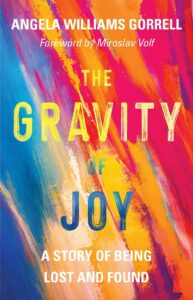 The Gravity of Joy: A Story of Being Lost and Found Angela Williams Gorrell (Eerdmans) $21.99 OUR SALE PRICE = $17.59
The Gravity of Joy: A Story of Being Lost and Found Angela Williams Gorrell (Eerdmans) $21.99 OUR SALE PRICE = $17.59
Speaking of crying through a book, this is brand new and I’m only part way through it, but it is beautiful, human, deeply faithful, really tragic, and yet beautifully hopeful.
Here’s the very short version – a quick summary that doesn’t do its eloquence and profundity justice: Ms Gorrell is a great writer and energetic, young teacher with a recent PhD who gets hired by the wonderful Miroslov Volf to be part of a Yale research team studying human joy. With a good grant, their Joy Project was connected to the Yale Center for Faith and Culture and just before she was set to start teaching a class (on what makes life worth living) a beloved young adult relative took his own life. Reeling from that tragedy, another young adult nephew died from an unexpected health matter. The night before teaching her first class ever at Yale she got the phone call that her opioid-addicted father was slipping away. She faced three horrible deaths in less than a month while starting to research what bring joys and human flourishing. Can you imagine?
This heavy memoir about depression and addiction and grief and loss and struggle and hope doesn’t seem to have a false line in it. The exuberant forward by Volf made me want to pick the book up immediately; he honors her and it is itself very touching. In The Gravity of Joy Gorrell is honest about the troubles in her family – the first several chapters includes much about her previously vibrant, lawyer father and her faith-filled upbringing. Even as she tells her story, she weaves other insights gathered from the interviews done by the Joy Project team and while it is grave, it is captivating and sad.
And then she starts telling the stories of the women she met while doing a Bible study in a prison. Oh, my. Wow.
As Parker Palmer puts in on the back, “There is not spiritual cheerleading here, no cheap grace.”
This powerful read has gotten some stunning reviews. I love these moving recommendations by important, thoughtful folks.
A searingly honest, devastatingly painful, profoundly wise — and beautiful — book. Once I started reading it, I couldn’t put it down. Angela Gorrell is a scholar with the courage of the most authentic memoirist. She generously and unflinchingly brings the theological discussion of the most sublime subject–joy–right into the middle of the mess of life and lets it unfold in surprising and wondrously disrupting ways. — Tod Bolsinger author of Tempered Resilience: How Leaders Are Formed in the Crucible of Change
The Gravity of Joy is a story of hope in hard times. Angela Gorrell artfully tells her story of faith, pain, and joy. She weaves it with the stories of others–family, women she met in prison Bible study, students, travelers, she met on her journey. And she shares a truth that perhaps is discovered only by those who have faced love and loss — especially those society has used and abused, denied dignity to in life and death: that joy comes in the mourning. I encourage all who hunger for justice, peace, acceptance, and comfort to read this book. In its pages you will find beautiful prose and hope that even in the darkest of spaces, places, and times — through addiction, suicide, sudden death, prison, abuse, and despair — love reigns, truth reigns, joy reigns. — Liz Theoharis, co-chair of the Poor People’s Campaign: A Call for National Revival and author of Always With Us?
The Gravity of Joy is a unique exercise in vulnerable theology. Weaving memoir and journalism, theology and testimony, Gorrell invites us into the unthinkable to discover the possibility of a joy that surpasses understanding. Written with eyes wide open, this book is a reminder that the cracks in a broken heart can be openings for grace. — James K. A. Smith, author of You Are What You Love and On the Road with Saint Augustine
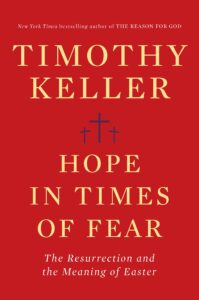 Hope in Times of Fear: The Resurrection and the Meaning of Easter Timothy Keller (Viking) $27.00 OUR SALE PRICE = $21.60
Hope in Times of Fear: The Resurrection and the Meaning of Easter Timothy Keller (Viking) $27.00 OUR SALE PRICE = $21.60
Speaking of hope and joy in the midst of suffering. Did anybody see Tim Keller on “Morning Joe” the other day? One of our staff said he talked about seeing the colors of the river in new ways given his different pace of life and attentiveness with his serious cancer diagnosis. He had a brilliant piece about living with such a diagnosis in The Atlantic last week and he alludes to writing this new book, Hope in Times of Fear.
It is, as you might guess, a fairly intellectual, but yet nicely written and impeccably clear argument for the bodily resurrection of Christ. It offers an apologetic, some cultural analysis, at one point tells some of his own story, including 12 chapters offering different sorts and descriptions of hope. There is certain hope, future hope, glorious hope, subversive hope, hope for relationships, hope for justice, hope in the face of suffering, and more.
His description of “the great reversal” – our sinful condition replaced with God’s gracious goodness, darkness to light, mourning to dancing — is solid and inspiring. I have not read much of this but surely, surely will. I am sure you know someone who needs this persuasive case for the implications of orthodox belief on the things that matter most.
I jumped ahead and read the intriguing epilogue, which riffs on a favorite song of mine, Noel Paul Stookey’s “Building Block” which takes its cue from Psalm 118 about the stone that is rejected becoming the cornerstone “of a whole new world.” Keller shifts to a Psalm of lament asking if the dead can praise? Ahh, yes, because of the rejected one and the “great reversal” we indeed surely can. It is a tender and wise and realistic meditation closing a must-read, wonderfully important book for our own fearful times. Hope in Times of Fear: The Resurrection and the Meaning of Easter is highly recommended.
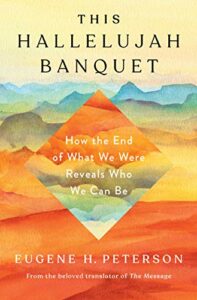 This Hallelujah Banquet: How the End of What We Were Reveals Who We Can Be Eugene H. Peterson (Waterbrook Press) $18.00 OUR SALE PRICE = $14.40
This Hallelujah Banquet: How the End of What We Were Reveals Who We Can Be Eugene H. Peterson (Waterbrook Press) $18.00 OUR SALE PRICE = $14.40
I have read only one chapter in this recent volume, but I can tell you two quick things about the book – and that is really all I need to say. These are sermons preached in the 1980s by our late friend Eugene Peterson at Christ Our King Presbyterian Church in Bel Air, MD. It was a Lenten series Pastor Pete did in 1984, actually, and the editors assure us they did not edit them much at all.
There is one extra long introductory sermon that was pieced together from another source – sounds like the formation of the canon, almost (ha!) This late edition rounds out the book very nicely and is so seamlessly integrated one might not know it was preached later in Peterson’s life, and not to his late 20th century suburban Maryland parish.
I’m sure you are hearing good sermons this Lent. (Well, I’m hoping you’re hearing good sermons.) Most preachers work hard and do pretty well. But even most pastors know that some are exquisitely gifted at preaching (and that some are able to work harder at it than others.) Your preachers will not be offended if you commit to reading a few more well crafted sermons this season. Rev. Peterson wasn’t a very fancy preacher nor a spectacular communicator. He read his sermons; he was a Presbyterian for God’s sake. But he had a gift and he stewarded it well. And these sermons were offered for God’s sake, as part of weekly worship, to inspire and instruct his ordinary, gathered flock. Maybe you, too, need some substance and good sermons this season — not glitz or drama or spectacle, just no-nonsense, beautifully constructed, Bible preaching. This Hallelujah Banquet could be a real lifeline for you.
And here is the second thing you should know: these sermons are on the book of Revelation. Yep. You may know that Peterson went on a few years later to write a pretty remarkable set of reflections (not exactly a commentary) on the Apocalypse of Saint John called Reversed Thunder: The Revelation of John and the Praying Imagination. I suppose that good book had its genesis in these very sermons. We are glad that have made their way into a new Peterson book this year of our Lord 2021.
Oh, and a third thing I should note – there is a great reflection/study guide in the back (even with blank pages for journaling.) The editors explained how Peterson disapproved of anything formulaic or suggesting simplistic answers or forced spirituality, so they are careful to invite folks to pray and discern God’s voice to them in their own setting and context. It’s a nice touch for This Hallelujah Banquet.
ALSO: We are still taking PRE-ORDERS for Winn Collier’s forthcoming, authorized biography of Peterson which releases March 23, 2021. It is called A Burning in My Bones: The Authorized Biography of Eugene H. Peterson (Waterbrook Press; $28.00. Our SALE PRICE = $22.40.)
 The Seeker and the Monk: Everyday Conversations with Thomas Merton Sophfronia Scott (Broadleaf Books) $17.99 OUR SALE PRICE = $14.39
The Seeker and the Monk: Everyday Conversations with Thomas Merton Sophfronia Scott (Broadleaf Books) $17.99 OUR SALE PRICE = $14.39
I am very interested in the writings of Thomas Merton and have read my fair share. But I think I am even more interested in books about the New York/Kentucky monk, about those who have encountered Merton, those who have read him, those who have grappled with him. You may recall that I did an extended review a year or so ago of the fabulously interesting The Monk’s Record Player by Robert Hudson which was about Merton’s fascination with Bob Dylan circa 1966; I have given shout outs to the remarkable report of a pivotal weekend with Merton called Pursuing the Spiritual Roots of Protest: Merton, Berrigan, Yoder, and Muste at the Gethsemani Abbey Peacemakers Retreat by Gordon Oyer. I often recommend one edited by Jon Sweeney called What I Am Living for: Lessons from the Life and Writings of Thomas Merton (although Sweeney has a new introduction to Merton coming in April.)
But this new one, The Seeker and the Monk: Everyday Conversations with… – by a heck of a great writer, an African American woman living in New York as Merton once did – may be the best of this kind. I was immediately captivated by what was going to be a quick skim and I spent much of last Sunday afternoon listening in as Sophfronia dialogues, through her writing, across the decades, with Fr. Thomas. What a book. Barbara Brown Taylor wrote the great foreword and she says “The beauty of this book is that [Scott and Merton’s] intimate conversations open outward to include anyone listening in, confident that what is deeply true about any of us is deeply true about all of us.”
Other back-cover endorsements include a rave review by Dr. Willie James Jennings and Patricia Raybon. Ms.Raybon is right – “If you know Thomas Merton you must now know Sophfronia Scott.”
Kudos to Broadleaf for doing so many good books lately, and designing them so very nicely. This is a lovely, well-done book and we are grateful.
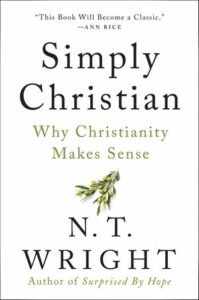 Simply Christian: Why Christianity Makes Sense N.T. Wright (HarperOne) $17.00 OUR SALE PRICE = $13.60
Simply Christian: Why Christianity Makes Sense N.T. Wright (HarperOne) $17.00 OUR SALE PRICE = $13.60
At long last! Finally! Hooray! This great book has been a fairly expensive (and, I might add, a bit plain-looking) hardback since 2006. That’s fifteen years I’ve been waiting to tell you that this is now in an affordable paperback. And, happily, this brand new paperback is pretty nifty looking. The letters are embossed just a bit, as is the bit of greenery on the front. The font is good and the white cover is bright. It is a better looking book in paperback than the hardback was.
The material, though, is the same — stellar and, as you’d expect, wonderfully written. It is a somewhat more foundational book with the solid themes Wright has picked up again in his recent (marvelous) Broken Signpost: How Christianity Makes Sense of the World. If you liked that one – and it is brilliant! — you will very much appreciate this as its necessary prequel.
The point, as you may know, is that, not unlike Mere Christianity (that doesn’t play so well these days with younger readers) there are things in our daily experiences – our longings, our hopes – that are so real they must be there for some purpose the are signals of transcendence. We sense voices calling (for meaning, for beauty, for justice, to be loved) and that echo of a voice that we seemed wired for just might be coming from God. Something about our experience of the creation just might be a signpost pointing to a Creator. Perhaps those deep questions and longings could be answered by the Biblical story. This is Wright’s effort to help modern skeptics in our secular age see the plausibility for the truthfulness of the gospel story. Simply Christian is persuasive and speaks to the heart and the mind; it invites us to a deeply personal faith that has cultural significance. It is, as one reviewer wrote, “a rigorous and mind-expanding explanation of the essence of Christianity.”
We are so glad to finally be able to announce this as a brand new paperback, handsome and as thoughtful as ever. Highly recommended.
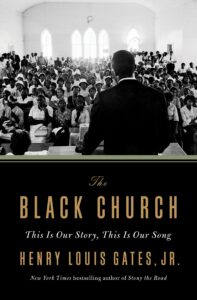 The Black Church: This is Our Story, This is Our Song Henry Louis Gates, Jr. (Penguin Press) $30.00 OUR SALE PRICE = $24.00
The Black Church: This is Our Story, This is Our Song Henry Louis Gates, Jr. (Penguin Press) $30.00 OUR SALE PRICE = $24.00
There are so many resources coming out throughout the year to help us all learn more about the experience of non-white folks in America and with Black History Month each year, there is even more. Although we think it is important to continue to feature books that chip away and help us learn and learn again about how to be anti-racist (and you know we have a lot!) this new book on the history of the black church is a treasure, a gem, a masterpiece. For another customer recently I made a list of the best books we had or knew of about the history of the African American church and I named some standards and some favorites and one or two that I think are really important. But this? This! This is the one!
Dr. Henry Louis Gates, Jr. is an important and rather charming public intellectual whose good books should be well known. He has made films and is known for his recent foray into genealogy as shown in his “Finding Your Roots” TV show. He is a distinguished professor at Harvard and prolific author and his last book – it came out about a year ago in paperback – was Stony the Road: Reconstruction, White Supremacy, and the Rise of Jim Crow (Penguin; $20.00.) The brand new one, The Black Church is simply the best book on the subject and it is happily a delightful companion to the much-acclaimed PBS documentary.
Literary world advanced press on this was very favorable. Some of these are from journals that don’t always or easily give out “starred” reviews and such kudos:
Readers of American religious and African American history will not want to miss this title. — Library Journal
Through meticulous research and interviews . . . Gates paints a compelling portrait of the church as a source of ‘unfathomable resiliency’ for Black ancestors as well as the birthplace of so many distinctly African American aesthetic forms. . . .Powerful, poignant, and ultimately celebratory. Let the church say, ‘Amen!’ —Kirkus (starred review)
A brisk and insightful look at how the Black church has succored generations of African Americans against white supremacy. . . . Punctuated by trenchant observations from Black historians and theologians, Gates’s crisp account places religious life at the center of the African American experience. — Publishers Weekly
And then, there are these reviews by Gates colleagues and sometimes conversation partners, two other esteemed black public intellectuals, Cornel West and Eddie Glaude.
Read these:
Henry Louis Gates, Jr., has once again delved deep into the doings and sufferings of Black people in the USA! This time he gives us a rich story and riveting song of the profound forms of spirituality and musicality that sustained Black sanity and dignity. Although Gates rightly highlights the centrality of the ambiguous legacy of the Black Church, he also explores the crucial realities of Islam and other non-Christian religious practices. And the last powerful and playful chapter on his personal dance with an elusive Holy Ghost lays bare his own signifying genius grounded in a genuine love of Black people and culture! — Cornel West, author Why Race Matters
Absolutely brilliant — a book that should spark a very rich conversation within the field and echo far beyond it. Its reckoning with the Holy Ghost in the context of Gates’s own childhood is extraordinary. More than a wonderful synthesis of a deep literature about Black Christendom, it is a necessary reminder of where the Black community has found its strength to persevere, and to fight, and where it must find it still. Not least, Gates shows us that sacred music has never just been music; it is a taproot and a through-line across all of American history. A necessary and moving work. –Eddie S. Glaude, Jr., author of Begin Again
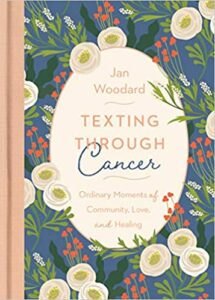 Texting Through Cancer: Ordinary Moments of Community, Love, and Healing Jan Woodard (Upper Room Books) $17.99 OUR SALE PRICE = $14.39
Texting Through Cancer: Ordinary Moments of Community, Love, and Healing Jan Woodard (Upper Room Books) $17.99 OUR SALE PRICE = $14.39
When I heard not long ago that this book was about to come out I was so glad, and was particularly happy to hear it was being done by the reflective, spiritual publishing house arm the famous The Upper Room ministry. They always do a good job with their good books, and we were grateful to God that this book would be nicely published.
You see, Jan Woodard is the mother of an old friend, a good friend from the same town where I went to college – the home of classic actor Jimmy Stewart; Indiana, Pennsylvania. I believe we met more than once at some Christian conference or another and when we heard that Jan was sick and writing a set of columns for her local paper – the Indiana Gazette – we were somehow touched. That someone would use their cancer for the sake of others, to tell her story, to artfully write about her journey, is naturally touching. That it was somebody we felt an even small connection to was meaningful. That it was somebody who was a good writer and frank about it all makes it great.
Jan signed all her columns about her cancer story with the famous “All will be well” line from Julian of Norwich. Not bad for a small-town, Pennsylvanian, United Methodist, eh? To be clear, this isn’t a superficial hope or trendy sentiment, as Jan studied contemplative spirituality during these years, her suffering became a catalyst for her deeper discipleship and her move into a cohort of fellow-travelers who studied monastic spirituality, went on pilgrimages (even to Iona!), embraced Celtic practices, and more. Her telling about learning these things isn’t mystical or deep, just very plainly and nicely explained, tinged always with the vexing unknowns of her breast cancer.
Writing shifted her focus to others, we are told. It kept her from feeling sorry for herself. It helped her move from fear to faith.
As it says on the back Texting Through Cancer “shares the beauty Woodard discovered in ordinary moments and the peace found in surrendering her cancer to God.” She lived to know that the manuscript was at the publishers and was glad to know her texts become newspaper columns would bless people worldwide as they did in Indiana. When her husband called the shop the other day I got off the phone and prayed through sadness and ended up glad that this book was on its way. It’s going to bless others and remind us all that “all shall be well.”
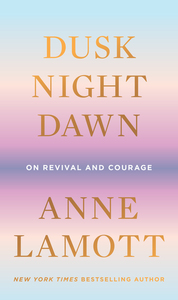 Dusk Night Dawn: On Revival and Courage Anne Lamott (Riverhead) $20.00 OUR SALE PRICE = $16.00
Dusk Night Dawn: On Revival and Courage Anne Lamott (Riverhead) $20.00 OUR SALE PRICE = $16.00
I have said it before – we adore St. Anne’s honesty, her faith born of struggle and addiction and sorrow, her joy. We love her creativity and her upbeat spirit. She’s kind and wants to be kinder and she is spiritual and wants to walk in grace more consistently. She tells these things in fun and clever ways making her one of the great wordsmiths of our time. Man, can she turn a phrase. And make me laugh. Beth, too. What a storyteller! She is a novelist as well, but her fiction is no match for her memoiristic, true stories, which make me verklempt and chortle within the same few pages.
Like her others Small Victories: Spotting Improbable Moments of Grace, Almost Everything: Notes on Hope, or Stitches: A Handbook on Meaning, Hope and Repair, Lamott is working on these questions of how to have personal hope amidst much loss and grief and how to help repair the world itself. What’s that saying about it’s better to light a candle than to curse the dark? Well, she does a bit of both, and better than many of us. Her books are a delight and nicely religious in a bohemian kind of offbeat way. And did I say she can tell a story and turn a phrase? This looks like a great book, handsome, solid, interesting. I’m sure many of her fans will snap it up and start reading it as a Lenten read. Do it!
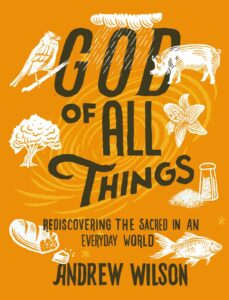 God of All Things: Rediscovering the Sacred in an Everyday World Andrew Wilson (Zondervan) $17.99 OUR SALE PRICE = $14.39
God of All Things: Rediscovering the Sacred in an Everyday World Andrew Wilson (Zondervan) $17.99 OUR SALE PRICE = $14.39
When this first was being described in a pre-publication catalogue that we booksellers get, I misunderstood a bit. I thought it was mostly a book about finding God in the ordinary things of life, a spirituality of the ordinary. There are a lot of books like that and we love ‘em. We even have a sub-section of our spirituality shelves about the spirituality of the quotidian and ordinary. And in a way, this book’s title and subtitle would lead you to believe it is just that.
I suppose we will put one in that section but, really, the subtitle is a bit misleading. It is less about experiencing God as we walk in God’s creation, but learning about God in ordinary earthly metaphors in the Bible. And that is done very well. As Hannah Anderson – who did write a book about finding God’s glory in nature, called The Turning of Days — writes on the back “From rainbows to donkeys to everyday tools, this is a delightful primer in learning how to truly see things for what they are.” Or, as Collin Hansen of The Gospel Coalition says, this book “weaves biblical theology with everyday illustrations.”
Hanson and Anderson both promise that we won’t see ordinary stuff in the same way again, we will see things for what they really are. I’m not so sure about that, as I believe that in God’s world, things are what they are; creatures; Psalm 199:91 says all things are servants of the Lord. (Which is why I love the title about a faith-infused worldview for farming by Joel Salatin called – get this! – The Marvelous Pigness of Pigs.) The Bible exalts the creation itself as praising God and the creation narrative reminds us that God called his stuff “good.” We don’t have to spiritualize things or have them point us to God in order to appreciate them. They just do it in their very thingness and we can enjoy them as they are. Plato was wrong that this world is some shadowy cave and we need to get to the really real. The Christian Science cult teaches that and in a way Buddhism teaches that. It was a heresy of the early church (Gnosticism) that failed to affirm the essential realness of the real. But we Christians sing “This is Our Father’s World” – right?
Okay, I’ll admit, I’m getting a little arcane here, maybe pressing a distinction without much of a difference. Which is why although I don’t think this book is quite so much about finding God in the world, it does, in a very important way, help us do that.
You see, God of All Things is mostly about what the Bible says about certain things. Every chapter is a great teaching about something in the Bible that the Bible itself tells us points us to God. So, to be honest, unlike, say, Hannah Anderson’s book or any number of other “spirituality of the ordinary” reflections, I don’t so much want to go out and see God’s good world after reading a chapter of God of All Things, I want to read another chapter and learn more about what the Bible says, its colorful images, its creational metaphors, its honey and gardens and pigs and sex and stones as pointers to God in the text. In a way, the editors got the subtitle of this book backwards – it is, by my lights, about “rediscovering the everyday world in the sacred story.”
So each chapter is about a thing described in the Bible and something it teaches us about God.
And that, my friends is a great project. After spending a few hours doing this kind of Bible learning — seeing the wonderful ways the Bible speaks of the “things of God” – the things! — we just might be able to go out into the world of things and encounter them anew. This isn’t a spirituality of natural history or even creational theology. It is Biblical theology about the character of God and God’s ways as revealed in ordinary things. And for that, we are grateful and recommend this sturdy study. As Duke Kwon says of it, it is “a tour of delight! Read God of All Things and you will be certain to grow in godward worship and childlike wonder.”
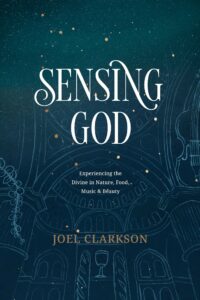 Sensing God: Experience the Divine in Nature, Food, Music, and Beauty Joel Clarkson (NavPress) $15.99 OUR SALE PRICE = $12.79
Sensing God: Experience the Divine in Nature, Food, Music, and Beauty Joel Clarkson (NavPress) $15.99 OUR SALE PRICE = $12.79
If you tracked much with my conversation above – the strengths of God of All Things and my take on the misleading subtitle – this one by theology student and lit lover Joel Clarkson is more perfectly in the genre of what I sometimes call “the spirituality of the ordinary.” While Andrew Wilson helps nudge us – heck, it’s a holy push – to see God’s declaration in Scripture that things reveal things about Himself and to learn to read the Bible with an eye to how it helps us reframe our daily perception of the stuff of life, Joel Clarkson takes us right, smack-dab, into the wonder and mess and goodness of this life, experienced with our senses. As he says, “So much of our faith is lived out in our heads. We study the Bible, sit through sermons, pray with our eyes closed. All of these are good things. A healthy Christian life, however, goes beyond these essentials.”
Yes! If as young Mr. Clarkson insists (based on the Bible’s own teaching – his theological orientation is similar to Wilsons, actually) “the glory of God is woven into the world” and we can experience it with our senses, then the very goodness of God is waiting to be tasted and seen in everything around us. We need to get our noses out of the Book a bit and into life, abundant life.
As our friend Marlena Graves (author most recently of The Way Up Is Down: Becoming Yourself by Forgetting Yourself) writes of it:
“Refreshing. Restoring. Reorienting. Clarkson accentuates the good, true, and beautiful in the reality of our lives and in creation, beckoning us to stop, look, listen, taste, touch, and hear for ourselves — to experience our triune God and the Kingdom with our whole being. The book itself is a feast because it is steeped in God’s life. It is true and elicits joy. Through it, I have beheld God. It is a book for such a time as this, and I couldn’t be gladder for it. I highly recommend it and look forward to more from Clarkson! — Marlena Graves, author of The Way Up Is Down
Abstract painter and Christian thinker and author Makoto Fujimura wrote the foreword, which speaks volumes about its substantive aesthetic and its vision. Listen to this line for the foreword:
In a world where many acts of violence are called sense-less, this book lights the path toward a senses-full experience, now a necessary condition toward healing our fractured culture. — Makoto Fujimura, author of Art + Faith: A Theology of Making
Ashley Hales is an author we respect and her book Finding Holy in the Suburbs asks vital and lively questions about finding lifestyles of grace and beauty in the shadow of Costco and cul-de-sacs. And she is onto something, something like natural theology or common grace or a spirituality of the ordinary in the built environment. It didn’t surprise me how she resonated with Sensing God. Ms. Hales writes:
Both creation and the Incarnation show that God cares deeply about the stuff of earth. The problem is that most of us neglect capturing wonder in favor of productivity, efficiency, and hurry. Helping his readers develop a robust vocabulary of Christian imagination, Joel Clarkson gives us a feast for our senses. Theologically rooted, artistically curious, and reflective, Sensing God can help us learn again how to taste and see that the Lord is good. — Ashley Hales, author of Finding Holy in the Suburbs
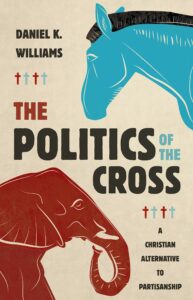 The Politics of the Cross: A Christian Alternative to Partisanship Daniel K. Williams (Eerdmans) $27.99 OUR SALE PRICE = $22.39
The Politics of the Cross: A Christian Alternative to Partisanship Daniel K. Williams (Eerdmans) $27.99 OUR SALE PRICE = $22.39
This is a biggee. A big book and an important book. I hardly have to explain it as who doesn’t long for a more civil, collaborative, heart of democracy that sees public service less in terms of which party wins but about whether the common good flourishes and public justice is enacted. The Bible is very clear about the demand for public life and insists that justice is one of the great attributes of God and one of the great values God wants built into the structures of human cultures. Government comes to mind, obviously, but in all of social life, God desires justice. And things now in our culture – partisanship, hostility, inane posturing, disinformation, conspiracies, conflict, deceit – are not just or good.
I have written passionately about the need for enacting the Biblical principle of developing the mind of Christ and the holy habit of “thinking Christianly” to shape our views of politics and our convictions about public life.
Too many of us vote inspired by principles and ideas inherited (wrongly or rightly) from the secular world, from an unwise diet of being exclusively informed by Fox News or CNN. We haven’t taken the time to study up on what the Bible says and what the best Biblical interpreters and teachers have said, about the nature of the state, the role of the government, the flourishing of the commonwealth, the different kinds of justice, each needed for the common good. We may even care about values other than justice when it comes to politics (like liberty, say, or having low taxes, say, or being a global leader or militarily strong or the meaning provider for the citizenry even though the Bible doesn’t not teach those things about the task of the government.) It is why we raved about Kaitlyn Schies’s The Liturgy of Politics: Spiritual Formation for the Sake of Our Neighbor (IVP; $17.00) which asks what sort of attitudes and habits we’ve developed about civic life and asks how we were shaped into these ways. It is so, so good!
To encourage responsible and faithful Christian citizenship I’ve highlighted books like The Good of Politics by James Skillen and the heady Political Visions & Illusions: A Survey & Christian Critique of Contemporary Ideologies by David Koyzis or the comprehensive process of how to do all this by Ronald Sider called Just Politics: A Guide for Christian Engagement. I often tell people at least to start with the simple and clear, short and sweet The Political Disciple by Vincent Bacote. Each of these invites us to be Biblical people influenced by Christian thinking in light of the Bible, and each end up with some sort of hybrid, third-way, alternative vision that isn’t left or right or even on the charts of that unhelpful spectrum.
The Politics of the Cross by Daniel Williams (an academic American historian and an evangelical adult Sunday school teacher) is working this same ground and he does so with academic credentials and a passion to be a good citizen and good neighbor. He is a follower of Jesus before he is an American, and he is an American before he is red or blue or purple. With the Scriptural call to be agents of healing and hope and Jesus’ command to be a peacemaker, Williams sets himself not only to “think Christianly” and Biblically about the issues of contemporary politics, but he frames this effort guided by his hope to repair the breaches between Republicans and Democrats and to restore some civility and common sense about the common good. He does this consistently throughout the book making it a resource unlike any of seen.
Williams is eager to find common ground on bipartisan strategies and build a persuasive consensus on moving forward where we can. This book is detailed and brilliant and it has left me with much to consider. I will be revisiting The Politics of the Cross after my quick skim and studying it more carefully, pondering, praying, talking with others, maybe even changing my mind about some long-standing convictions. Who knows, maybe it is what you need, too?
If you are pretty partisan – I hope you know who you are — you need this book. If you are adamantly non-partisan and want to see ways to make civility and bridge-building more of a reality, you need this book. If you think common ground means mostly compromise and settling for less than what we most deeply believe, you really need to read this hopeful, principled, and realistic work. If you think that Christians can’t be simultaneously somewhat affirming and also seriously critical of both historical ideologies (left and right) and both current major parties, you’ve got to read his even-handed, sober, theological concerns about each party. Wow.
Please read these recommendations carefully. I think you might realize, especially given the crisis of our times, that this is book you should buy and study and share.
Daniel Williams is one of our finest historians of evangelicals and politics. In The Politics of the Cross, he draws on his previous works, but takes us even deeper into these issues through timely theological reflections on how evangelical Christians should engage in public life. His chapter on abortion alone is worth the price of the book. — John Fea author of Believe Me: The Evangelical Road to Donald Trump
We live in a time when far too often partisan politics and catchy slogans replace thoughtful Christian engagement. Fiery rhetoric is often detached from fair-minded assessment of the past and present. It occurs on both sides of the aisle. Thankfully we have people like Daniel K. Williams, who offers both the nuance of a historian and the concerns of one committed to the fullness of ancient Christian concerns. This book will at times surprise, but also hopefully inform and encourage, those seeking to more faithfully navigate the debates of our age. — Kelly M. Kapic Covenant College, theologian
Partisanship in the United States has reached unsustainable levels. With characteristic care and earnestness, Daniel K. Williams proposes a practical and satisfying way forward for our national discourse that is deeply informed by history, Scripture, and Christian tradition. Operating from the assumption that church and state interests need not be at odds, and Democrats and Republicans need not be mortal enemies, Williams offers a needed voice of wisdom, compassion, and maturity to a nation that seems on the brink of moral, political, and spiritual collapse. If ever such a voice was needed in American civil discourse, it is now. And if ever there was an example of a Christian thinker for such a time as this, it is Daniel K. Williams. — John D. Wilsey The Southern Baptist Theological Seminary, author of American Exceptionalism and Civil Religion: Reassessing the History of an Idea
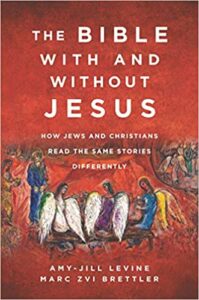 The Bible With and Without Jesus: How Jews and Christians Read the Same Stories Differently Amy-Jill Levine & Mark Zvi Brettler (HarperOne) $34.99 OUR SALE PRICE = $27.99
The Bible With and Without Jesus: How Jews and Christians Read the Same Stories Differently Amy-Jill Levine & Mark Zvi Brettler (HarperOne) $34.99 OUR SALE PRICE = $27.99
Okay, I’ll admit that this one is not brand, brand new. It came out in the early winter, 2020, to be honest. But it has been sitting here stacked up in our Bible section and I’ve been itching to tell you about it. (We are glad a number of folks have inquired and called about it.) Alas, with Covid and the holidays and Jubilee and the hectic pace of the work here, I’ve just not gotten to read it. I have wanted to study up and weigh in, telling you my thoughts. But as Dana Carvey’s SNL caricature of George Bush went, “Not gonna do it. Wouldn’t be prudent.”
But I will remind you that we have all of Amy-Jill’s books (including her other recent 2020 release, a well informed, six-chapter paperback, Sermon on the Mount: A Beginner’s Guide to the Kingdom of Heaven, nicely published by Abingdon Press.) You most likely know her name and story.
Dr. Levine is a Jewish professor of New Testament at Vanderbilt, a Christian divinity school. She does not see herself as a Christian although she is respectfully knowledgeable, even passionate – some would say feisty — about, church history, Christian theology, and, especially, the gospels. She edited on Oxford University Press The Jewish Annotated New Testament.
Importantly, she knows that Jesus and his earliest followers understood His own Messianic claims. “Christ” is not Jesus’ last name, it is his title. Nobody who studies the gospels denies that Jesus said this about himself and that his earliest followers worshipped him as God and thanked him as Savior and obeyed him as King. They joined his movement to advanced His Kingdom, doing so by marshalling the Old Testament story of Israel, appropriating it, as we say.
And there is the rub. There is a difference between a Christian reading and interpretation of the Bible and a Jewish one. Professor Levine and her co-author, Duke Religion Professor Marc Zvi Brettler, are a great team to tackle this huge project.
The range of those raving about this on the back cover is itself remarkable. There are Jewish scholars, evangelical leaders, a Roman Catholic Jesuit scholar, and writers as diverse as Peter Enns and Richard Elliott Friedman.
I like Enns’ quote, in fact: who says it is a “call to action.” Jews and Christians embracing their own and one another’s interpretive heritage,” he says, “will foster greater understanding and respect.” Let us hope so.
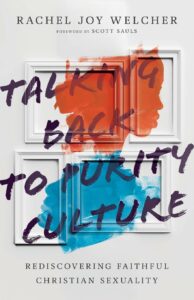 Talking Back to Purity Culture: Rediscovering Faithful Christian Sexuality Rachel Joy Welcher (IVP) $17.00 OUR SALE PRICE = $13.60
Talking Back to Purity Culture: Rediscovering Faithful Christian Sexuality Rachel Joy Welcher (IVP) $17.00 OUR SALE PRICE = $13.60
I do not want to say too much about this as I may revisit it when I do a longer essay I’ve been working on describing other books on sexuality, including some recent memoirs about sexual attraction and identity and better treatment of our LGBTQ siblings in Christ. There are a lot of diverse books coming out and some are very well written. More later.
For now, though, I want to highlight this very well-done book by Rachel Joy Welcher, a woman with a Master’s in lit (from the impressive St. Andrews), who is an editor at Fathom magazine and a published poet. She is doing something rather rare in this thoughtful book and it can be easily described. Like several other (often painful and important) books with stories of young people (usually women) left discouraged and wounded by the fundamentalist and evangelical fetish about sexual purity, she “pushes back” against what has come to be known as the previous evangelical world’s “purity culture.”
In the bookstore here and in the raising of our three kids we never felt comfortable with this overblown and often fear-based and shameful insistence on religious purity, since, well, since Jesus overturned most of the purity codes and touched sinful lepers who filled the faithful with disgust, women during menstruation, those who were, as we’ve learned to put it politely, sexually active. As much as we affirmed the standard Biblical teaching that intimate sexual expression is designed for marriage, the language of purity just drove me crazy. We never did the purity rings, the daughter-daddy dances, the constant haranguing about modesty, making an idol of virginity.
Not all evangelicals were so fascinated with this, but if books like Pure: Inside the Evangelical Movement That Shamed a Generation of Young Women and How I Broke Free by Linda Kay Klein and the stories they tell are true, there are lots of lots of younger adults who have looked back and felt deeply uneasy, in some cases traumatized, by this sometimes public shaming with youth groups, church camps, Sunday school classes and those taking their cues from the increasingly right wing politics of Focus on the Family. Some, now, happily or unhappily married, resent the dumb promises their youth leaders guaranteed, that sexual abstinence in teen and college years would yield a great marriage and fantastic sex life later.
And here’s the thing: in many of these accounts, those who have moved on to a less strident approach to God’s good but fallen gift of human sexuality have left traditional Christian approaches almost all together. Or they have left Christianity all together. (That is the story of many in Klein’s Pure reporting and it is heartbreaking for those of us who think connection to the story of God in Jesus through the church is essential for normative human flourishing.) Many of those pushing-back in several books and a plethora of blogs and podcasts have not only called for refining how we think about sexuality but have often so deconstructed the faith that in some cases it is no longer tethered to the Biblical testimony at all, or not even Christian at all. As I’ve said, some have just walked away from this legalistic and shaming part of their upbringing, this judgmental ethos, leaving faith behind altogether.
(That the formerly heavy-handed Joshua Harris of Soverign Grace church, famous for the strict and in our view pretty stupid I Kissed Dating Goodbye has renounced his book, and has left his wife and Christianity, is just one very public example of the intensity and complications of this discussion.)
And this is what makes Rachel Joy Welcher’s new IVP book very, very useful for many. Agree or not with her fairly conventional sexual ethics, she is robust and firm in her reconsideration of purity culture, offering a gracious and culturally wise, compassionate and faithful approach instead of its weird strictures. It is fairly simple to say (as it does on the back cover) that Welcher’s Talking Back “rejects legalism and license alike” but what that looks like, what kind of path she charts, how she “steers us to the good news of Jesus” is complex, nuanced, and often beautiful. The book is really interesting and very well written. It is a book that is so valuable for those who want to critique and even renounce some of the former evangelical attitudes and habits without leaving the evangelical fold or a Biblical orientation.
Most books on “purity” and modesty and the like that I’ve seen are in fact, either legalistic (if not even toxic) or pointing to what might be unhealthy license. Talking Back to Purity Culture: Rediscovering Faithful Christian Sexuality is a balanced, gospel-centered, gracious and yet firmly orthodox view. She has listened well and studied the current literature. Talking Back to Purity Culture is well researched, it is solidly Biblical, and yet offers at least somewhat of a new approach. It will be “too much” for some, I fear, and “not enough” for others. Yet, there is nothing like it and we recommend it for your consideration.
Blurbs on the back offer rave reviews from Karen Swallow Prior, from Barnabas Piper, from Jessica Van Der Wyngaard (director of “I Survived I Kissed Dating Goodbye” documentary.) These are voices that are not quite like, say, Linda Klein or Nadia Bolz-Weber’s passioante and moving Shameless: A Case for Not Feeling Bad about Feeling Good (about Sex.) These are main-stream, moderately conservative, culturally-savvy and gracious evangelicals who affirm this book for pushing them a bit and standing up to problems in the conservative sub-culture of the evangelical church.
Listen to these two remarkable affirmations of the book:
Impeccably researched, gently written, and a timely word for those who grew up kissing dating goodbye, wearing purity rings, attending abstinence rallies, and waiting (perhaps waiting still) for their ‘one.’ Welcher is deft in her exploration of what went right and what went wrong for the lives of millions of Christians-before marriage and after it-and she is careful in her admonition to future leaders and lovers. A needed and healing work. — Lore Ferguson Wilbert, author of Handle With Care: How Jesus Redeems the Power of Touch in Life and Ministry
Talking Back to Purity Culture is saturated with gospel truth and clarity that confronts the overwhelmingly legalistic, shaming, and hopeless rubric of purity culture―especially the ways in which it blames young women for the sins of their brothers and fathers. Parents, and especially you moms, it’s time to speak the truth to your children about sexuality and to assure your daughters of their worth as created in God’s image. I’m thrilled to recommend this wonderful book. — Elyse Fitzpatrick, author of Worthy: Celebrating the Value of Women
Remember, it is helpful if you tell us your shipping preferences when you order. Media Mail is cheapest but slow. (Just for instance, it’s $3.50 for one book.) UPS is more reliable, but costs more. (Just guessing, but to most places for one or two books it’s about $8.00.) It depends, course, on how many you are purchasing and to where we are shipping. If you want advanced details just ask and we’ll gladly figure it out for you ahead of time..
Our order form page over at our website is secure so you can safely enter credit card info OR it invites you to just ask for a bill so you can pay by check, later. Click on “inquiry” (below) if you have questions — but don’t forget to ask what you want to know.
BookNotes

SPECIAL
DISCOUNT
20% OFF
ANY BOOK MENTIONED
+++
order here
this takes you to the secure Hearts & Minds order form page
just tell us what you want
inquire here
if you have questions or need more information
just ask us what you want to know
Hearts & Minds 234 East Main Street Dallastown PA 17313
read@heartsandmindsbooks.com
717-246-3333

